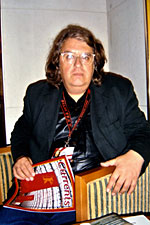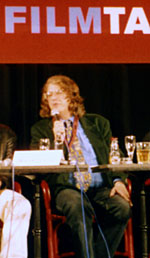 From September 24-29, the Hyatt Hotel sponsored Hyatt Filmtalk in the Hamburger Kammerspiele café. Guests, interviewed in a talk-show format, were directors or actors who were involved in films being screened at Filmfest Hamburg. The press and public were invited and admission was free. The moderator on the first night was director Jan Schütte, followed by journalist Christa Maerker the next night. Then British film critic Phillip Bergson from Yorkshire, England, moderated for the rest of the festival. This was Bergson’s second year of Hyatt Talks. Here is a talk he had with KinoCritics critic Becky Tan.
From September 24-29, the Hyatt Hotel sponsored Hyatt Filmtalk in the Hamburger Kammerspiele café. Guests, interviewed in a talk-show format, were directors or actors who were involved in films being screened at Filmfest Hamburg. The press and public were invited and admission was free. The moderator on the first night was director Jan Schütte, followed by journalist Christa Maerker the next night. Then British film critic Phillip Bergson from Yorkshire, England, moderated for the rest of the festival. This was Bergson’s second year of Hyatt Talks. Here is a talk he had with KinoCritics critic Becky Tan.
KinoCritics: How are you able to speak so many languages?
Bergson: When I was a child we always went on holidays abroad, so I learned Spanish. Then I won several scholarships and went to Oxford University, where I studied Latin and French. Of course Latin is the passport to any language: Spanish, Italian. And then there was Greek. I can read it as well as Russian.
K: But you also know German?
B: Yes, absolutely. At Oxford I wanted specifically to learn German. I was doing the classics and many great commentaries are in German. At Oxford they said, “No, no, you can’t. You’re already doing Greek and French and Latin; you can’t take another language.” The first film festival I went to immediately upon graduating from Oxford was Berlin. I’ve worked happily and often in Germany, and I’ve lived there on and off, a few weeks at a time. I watch films in the original German, but I do make some grammatical mistakes; for example, it’s still difficult for me to tell the difference between Sie and Ihr.
K: You obviously know Hamburg. I’ve heard you mention Plattdeutsch and Blankenese and Hamburg’s weather.
B: Yes, I have spent a long time in Hamburg over various years. I like Hamburg, and although it’s very different from Berlin and Munich, it is a very cosmopolitan city, a very English city.
K: Hamburgers claim that it is, but I didn’t know that the English agreed.
B: You drink tea and it rains.
K: Did you always know you would become a film critic?
B: I went to my first film festival before I went to Oxford. I had won a writing competition for New Statesman Magazine in England, a so-called left-wing weekly. They published my article in its entirety, something about the rape of the cinema, about sex and violence in cinema. That was my professional start, because with the money I could buy an Inter-rail train ticket to travel free throughout Europe. I went from London to Paris and I immediately saw a Fellini film in the afternoon. I went to the British Embassy because I had heard from the Home Office in Britain that my article had been bought and printed in English in a French magazine. I found this magazine and, encouraged by that, took the train to the Venice film festival. Liza Minelli was there with Cabaret. She was boycotting Cannes because they had treated her badly on her last visit there. At the press office, after showing them my articles, I got press accreditation. I was paying for my own hotel, of course. I made my first interview which was with Hans Jürgen Syberberg, a German director who had made strange films about Hitler. Subsequently, years later I interviewed him again when Parcifal had its premiere at the Vienna film festival.
When I went to Oxford, the student press had already read my article. I received little notes, upon my arrival, saying, “You’ll join the magazine and you’ll be the film critic, won’t you?” Of course I did and out of the course of four years I built up a big body of work in films. In fact almost one year later, I interviewed Robert Redford for the London Evening Standard: Redford was in town with All the President’s Men. He only agreed to speak to student journalists so the Evening Standard very cleverly got me into it. I did 800 words as requested and an hour later there was an urgent message, “We want another 200 words.” It made a great sensation in London. All the journalists were furious, even though later I actually met some of them and we became friends.
So then gradually I had a body of more articles, including proper professional magazines. In the summer after my first year The Spectator had me write from the Berlin festival. That was its last year in the summer before it changed to February. The following summer with another of these Inter-rail tickets I went to the San Sebastian festival – along with Elizabeth Taylor, Robert Burton, and Sophia Loren – to write for The Spectator.
At the end of my four years, when I finally finished my examinations, there was a telegram from the Sunday Times offering me the job of critic for two weeks while the critic went off on his holiday. So I started off on the Sunday Times and I’ve been working my way down. Then I diverged to the BBC, because at San Sebastian the previous year – that was the year of The Great Gatsby – I had sent something on cassette to London BBC and between the Sunday Times coming out with their article and this interview on the BBC, each thought the other had discovered me. I couldn’t have been more pleased.
I’ve always done print and radio, one thing or the other. I started by calling myself independent and now it’s freelance; everyone is freelance. Eventually I did a regular program for the BBC. For eight years I was the weekly film critic on an arts program and I would go to a festival, set up a studio and do a direct line. After a program at the Edinburgh arts festival, I started being approached at film festivals to be on juries and that is what I do now.
 K: What was your entrée to Hamburg?
K: What was your entrée to Hamburg?
B: It was a telephone call.
K: Who knew about you?
B: Oh, Albert (Wiederspiel, Hamburg festival director). As you know, this festival used to exist without any kind of profile. Albert has had a big career inside the industry in Germany, including at 20th Century Fox and the Berlin film festival. He was bringing the talent and I was writing reviews about his talent, so I’ve known him vaguely for years, not in any way personally, but I’ve always known him and he was always a good person. Hamburg couldn’t have chosen a better person to do this festival. He completely turned it around. The Hyatt Talk Show at the Kammertheater was a brand new idea – nobody had ever done one, to be honest, at any festival in the world in this serious way, to have a proper place every night, certainly not in Germany. To do it in English, I thought, was a big bold step. I thought it went very well last year.
K: It’s doing very year this year, too. What is this international film critics’ organization called FIPRESCI?
B: This is a group of international film critics. You can volunteer yourself for membership, but you have to be approved and accepted and prove that you have written something like 20 film-related articles in the last six weeks. There is a certain screening process. But anyone who is publishing regularly as a critic has a chance. The title, which sounds like the name of a Polish diva, is French: Fédération Internationale de la Presse Cinématographique. The FIPRESCI jury often awards film festival prizes and members are not allowed to reveal their preferences during the festival. I was in Lucerne and talked to the Mexican director Guillermo del Toro who said that the FIPRESCI prize that he got in Cannes for Cronos, his first feature film, completely launched his career. He couldn’t be more grateful to us.
K: Have you ever changed your opinion, had second thoughts, after your review was published and you realized you were in the minority?
B: What I do know, and this is a most arrogant thing to say, is that critics have come to me and said, “Phillip, you were right,” when my reviews were contrary to the general trend. I always try to be positive. For example: about American Beauty I said there is less here than meets the eye. The first time I saw it, I didn’t think it was so much either. So I wasn’t changing opinions upon a second viewing, rather it reinforced what I already thought. So, if I had liked a film, I wouldn’t six weeks later, or even six years later, say I was wrong. If I had hated it, I would want to give it a second chance. To be honest, I have not yet done that with Tarantino, but maybe I ought to, because I so dislike his films. I guess it’s also something to do with age and experience. If you’ve only seen one Iranian film you might not like it and if you’ve seen 20 you might understand it more.
Sometimes a film is a total disaster because it was summer or was released during the Iraqi war. Sometimes it becomes fashionable later or there is a new version, a director’s cut.
It’s like Greek and Latin literature, which are fragments and where you need the body originally attached to that work, the body around it, to be able to really understand it. It can make a huge difference. On the other hand, something that is already boring and incoherent in three hours is not going to get better in four hours. But at least you have more of a connection between the scenes. This is something that Harvey Weinstein knew about when he was bringing foreign films to America, especially foreign language films. He almost personally re-edits films in a more commercial way, to adapt them for an American audience.
Woody Allen is probably just about one of possibly two directors who still have control of their films. So many films are changed after the directors have turned them in. Nobody was trying to make this kind of film; it was remade by the studio or the distributors even. Or you put a different soundtrack on it. Still all the elements have to be in harmony. When it’s released is important, too. For example a great film like Cleopatra suffered from too much publicity, so much hype. It was the film the world was waiting to see because of the Taylor/Burton romance so of course when it came out people thought, “This is not what we were expecting.”
K: Can you think of something about the Filmfest Hamburg which is different or special?
B: Emphasizing that the audience is more important than the stars or the press is very special here. It seems to work. There’s not just one audience attending a premiere with a star present. All the cinemas seem to be full all the time. There seems to be a very motivated public.